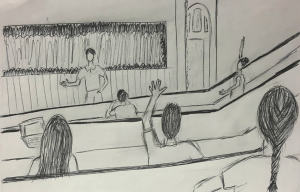GUSA Executive elections are annual exercises in voter apathy, lofty rhetoric, and ambitious promises that rival all but the most brazen of presidential candidates. But in a national election year that has witnessed the insurgent rise of anti-establishment tickets, all three GUSA campaigns’ pledges to shake up Hilltop politics as usual have attracted much-needed attention. This Editorial Board applauds Khan/Fisk, Howard/Maduike, and Chick/Madness for advancing platforms that recognize last year’s Luther/Rohan victory for what it was: a rejection of self-important candidates who treat GUSA leadership as a resume-builder.
This Editorial Board believes that, among the three tickets, Enushe Khan (MSB ‘17) and Chris Fisk (COL ‘17) represent the best chance to realize GUSA’s greater potential through institutional changes aimed at concentrating its collective efforts around the many issues that confront students.
Though we believe it to be the campaign most likely to effect the necessary change in GUSA, the Khan/Fisk ticket is not without shortcomings. While every ticket identifies a multitude of issues it aims to address, therein appealing to the various interest groups on campus, the foremost obligation of a GUSA presidential campaign is to be uncompromisingly forthright with the student body about its intentions. In identifying 23 different focus areas, the Khan/Fisk ticket promises an infeasible amount of progress for one term.
Therefore, this Editorial Board implores the candidates to make their priorities clear to the student body. While this Board admires bold aspirations, we reserve a healthy and cautious skepticism toward any fundamental restructuring of GUSA. In recognizing the inefficiencies in the present relationship between Executive and Senate, we also acknowledge that entrenched interests and institutional momentum serve to inhibit such a change.
This Editorial Board favors the approach that Khan/Fisk are taking to the division of power between the positions of GUSA President and Vice President. Much has been made of Khan’s summer internship at Goldman Sachs, given that it will take her off campus during the coming summer. This should not pose an overwhelming problem, as Fisk appears fully able to negotiate with the neighborhood, and the two have created something of a co-presidential ticket. This Board trusts Fisk’s ability to negotiate and does not believe that Khan’s absence from campus will be as detrimental as many may think. (Phentermine)
Despite this, the ticket still needs to make significant strides in engaging the student body. Political apathy among Georgetown students is not a new phenomenon, and Khan/Fisk appears ready to face this problem. They have proposed reaching out beyond GUSA’s office hours and have discussed coming to where the students are. Their proposal, including their team-based approach, has the substance and structure to be more than just rhetoric.
The Luther/Rohan Administration did an admirable job of attempting to increase student interest in GUSA, and it is important that its successor continue this movement. The changes proposed by the Khan/Fisk will help to make GUSA more accessible for students, although it is unrealistic to expect a complete change in just one year.
One of the boldest parts of the ticket’s platform is its proposed restructuring of GUSA. In the creation of policy teams comprised of both Senate and Executive members, Khan/Fisk aims to increase the number of student voices on policy issues, and to transcend the tensions between the two branches. This Editorial Board applauds Khan/Fisk’s desire to overcome internal rivalries and bureaucratic inefficiencies, which have, to varying degrees in the past, plagued GUSA with a general lack of coordination. The creation of these policy teams is a sound proposal for focusing GUSA’s efforts to address policy matters in concert.
Condemning failures of the system has become a familiar political refrain, fueling the rise of outsider candidates and reformist impulses both nationally and in this year’s GUSA race. But a candidate’s value depends little on his or her position relative to the establishment. “Outsiderism,” irrespective of substance, is worthless at best and obstructive at worst. What matters are a candidate’s ideas about how to work credibly within the system and alter it to achieve better outcomes. Enushe and Chris have launched an ambitious bid to do just that, a gauntlet to themselves and GUSA as a whole. Their comprehensive vision, productive rejection of the status quo, and attitude toward structural reform win them the Voice’s endorsement.







